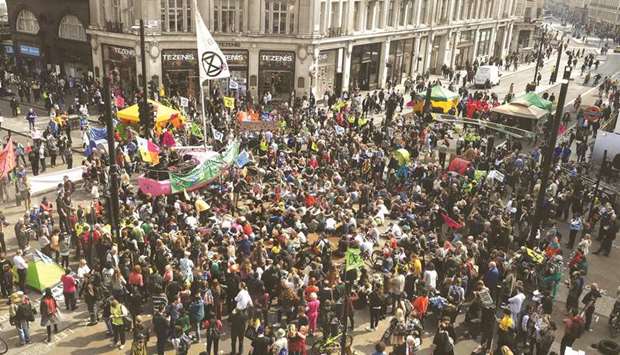Grassroots Conservative activists will try to press Theresa May to stand down as prime minister by forcing an extraordinary general meeting to allow a vote of no confidence from party members.
The vote would not be binding on the prime minister, but the National Conservative Convention (NCC) would be obliged to hold the meeting if more than 65 Tory association chairs called for one to be held.
The attempt, first reported by the Telegraph, has been organised by the Conservatives’ London East area chairman, Dinah Glover. The number of signatories has not been disclosed but Glover said she was confident of reaching the threshold imminently.
“It’s a snowball, we will definitely meet the numbers and exceed it,” she said. “It has been building for a lot of people. People were particularly angry when it became apparent that we were not leaving on March 29, that was a very low point when we lost members.
“Taking part in the EU elections is also a very physical reminder that Brexit has not been delivered. It is a very public humiliation, as is going into negotiations with Jeremy Corbyn.”
The motion drafted by Glover says the party “no longer feel that May is the right person to continue as prime minister to lead us forward in the negotiations.”
It adds: “We therefore with great reluctance ask that she considers her position and resigns, to allow the Conservative party to choose another leader, and the country to move forward and negotiate our exit from the EU.”
An extraordinary meeting of the NCC – the members’ body comprised of about 800 senior party officers – has never been called in the past and members would need to be given at least 28 days’ notice of the meeting. Party sources also suggested there would be no obligation to act quickly.
Glover said there was little campaigners could do to force the party to hold an EGM quickly, but their first priority was to put pressure on backbench MPs and Cabinet ministers to act because of the intensity of grassroots feeling.
“It is up to the party how quickly they move, but from my point of view this is extremely significant that this is happening at all,” she said.
“It gives power to the elbow of almost half of the backbenchers that voted no confidence in the prime minister in December and to those who decided it was not the right time but had sympathy with it.
“We are seeking to say, this feeling is growing, we don’t want to take this to an EGM, which is a last resort, but we have the numbers.”
May, who has already pledged to step down for the next phase of the Brexit negotiations, cannot face another binding no-confidence vote in her leadership until December, a year after she successfully defeated an attempt by MPs to oust her.
However, the Brexit delay has led Tory grassroots groups and Eurosceptic MPs to attempt to explore other ways of forcing her resignation.
MPs including Mark Francois and Andrea Jenkyns have already submitted further no-confidence letters in the prime minister to Sir Graham Brady, the chairman of the 1922 Committee of backbench Tory MPs, and urged him to hold an indicative vote of confidence in the prime minister.
The prospect of such a vote was discussed at length before the Easter recess by the committee, which eventually concluded it could not take place. The committee has also been asked to present May with a timetable for her departure, but it would not be binding on her.
Another option being explored is a little-known method to change party rules, which can be kickstarted by a petition of more than 10,000 members. One member, Soutiam Goodarzi, has started a petition to reduce the 12-month grace period after a no-confidence vote to three months.
However, it is unlikely such a change could be made quickly. The petition would only trigger a postal ballot of members of the NCC, plus MPs, MEPs and peers, which would take place up to two months after the petition would be received.
Two former chairmen of the 1922 Committee have also advised that MPs could change the rules among themselves to allow a leadership challenge sooner than December.
Writing in the Sunday Telegraph, Michael Spicer and Archie Hamilton said the 12-month rule on no-confidence votes could be changed if MPs agreed to do so.

Climate change activists blockade Oxford Circus on the third day of an environmental protest by the Extinction Rebellion group in London yesterday.
